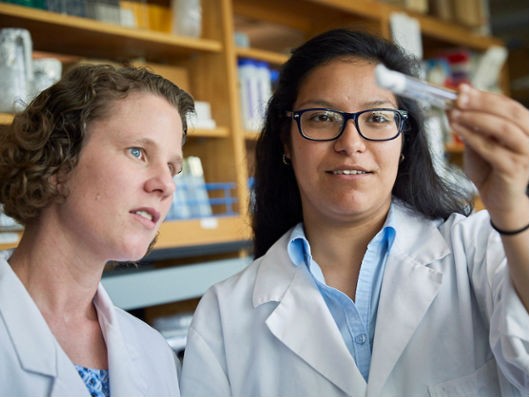From a single egg of a parasitic wasp, thousands of offspring are produced, including the different castes of soldiers and queens. But what genes are responsible for this fascinating process? Supported by a Presidential Summer Scholar Award, Dr. Margaret Smith, assistant professor of biology at the University of North Georgia (UNG), is working to answer that question with the help of senior biology students Sonia Alcantar and Andrew Shirley.
Presidential Summer Scholar Awards are part of an internal grants program initiated by UNG President Bonita C. Jacobs in 2013 to support meaningful research and scholarly and creative activities within the university. Since the program began, Jacobs has awarded more than $769,000 to fund proposals.
"These awards help our faculty and staff pursue projects and initiatives that help them grow and continue to lead in their fields, which adds value to the education our students receive," Jacobs said. "It is impressive to see how many of these activities also strive to involve students, giving them experiences that will make lasting impacts well into their professional careers."
Smith's award of $9,808 afforded her the opportunity this past summer to begin research examining the genes and biologic process behind this wasp's development. The results of the research could aid in greater understanding of basic biological processes like cell division and differentiation. Misregulation of these processes is the basis of some diseases.
"Faulty regulation of cell division is the basis of cancerous tumor formation. Likewise, misregulation of cells that produce eggs and sperm is the basis of many infertility problems. Understanding the regulation of these processes and what goes wrong with during the development of disease is required to eventually develop effective medical treatments and interventions," Smith said. "This research will identify and study the genes involved in regulating these processes.
After training with and mentoring under Smith, two undergraduate researchers have been carrying out the bulk of the research, which involves many hours of data processing to see where these genes are expressed in the embryos. The students also are working to develop techniques to identify the genes involved.
"Through this research, I've learned quite a lot about dissections and extractions of polygerm (the clusters of cells responsible for embryo development in these processes), what exactly polygerm looks like, the whole parasitic life cycle of the wasps, replication of genetic sequences, and more," said Alcantar, a first-generation college student who plans to become a physician. "It really is a tremendous learning experience and an opportunity to have a mentor who guides and supports me not just in the lab, but also in my life plans."
Also aiding Smith in the research is Rafael Hernandez, a junior majoring in biology.
The next group of Presidential Awards recipients will be announced later this year.

http://accesswdun.com/article/2016/11/473850/ung-research-identifying-genes-that-impact-embryo-development
